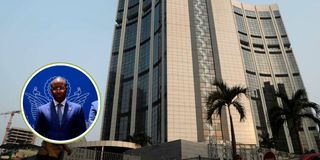
The headquarters of the African Development Bank (AfDB) in Abidjan, Ivory Coast. Inset: Former Senegal Planning Minister Amadou Hott.
The race for the next African Development Bank (AfDB) president is taking shape after the Senegalese government fronted its former Planning Minister Amadou Hott for the post.
Mr Hott’s candidature is likely test the unwritten rule on regional rotation.
Senegalese President Bassirou Faye on Thursday paraded Mr Hott, who served as minister under former President Macky Sall’s regime. President Faye described Mr Hott as the best person to replace Dr Akinwumi Adesina for the post.
Mr Hott will seek to replace a man who comes from his West African neighbourhood, Nigeria.
Mr Hott was Adesina’s inaugural vice president of the Power, Energy, Climate Change and Green Growth Complex (2016-2019), and later works as Special Presidential Envoy for the Alliance for Green Infrastructure in Africa (2022-2024).
“He has more than 25 years of strong and diverse experience, combining investment banking, development banking, sovereign wealth fund management and public policy,” a dispatch said.
The AfDB rules of procedure require that the president of the bank be an African citizen but doesn’t mention the rotational formula adopted by the African Union. Other senior positions may be held by citizens of other shareholder countries.
However, in a quest to ensure adequate representation, the issue of region always crops up, which is why some countries and regions where an incumbent comes from could routinely avoid contesting next rounds.
Past presidents
The bank itself has had successive presidents from the same region in the past, with a suggestion change in language dominance from Francophone to Anglophone, for instance. However, none of the past presidents has been a woman.
The bank has had nine presidents since it was established. They include Dr Adesina, who assumed office in 2016, Rwanda’s Donald Kaberuka (2005-2015), Omar Kabbaj (Morocco, 1995-2005), Babacar Ndiaye (Senegal, 1985-1995), Wila D. Mungomba (Zambia, 1980-1985), Goodall Gondwe (Malawi) (interim 1979-1980), Kwame Donkor Fordwor (Ghana, 1976-1979), Abdelwahad Labidi (Tunisia, 1970-1976) and Mamoun Beheiry (Sudan, 1967-1970).
The elections, which are due in 2025, have also attracted South African economist Bajabulile Swazi Tshabalala, an insider of the AfDB until this year.
Ms Tshabalala resigned from her role as the bank’s Vice President in October 2024 because rules require senior officials to quit their posts before declaring candidacy for the presidency.
“As number two at the African Development Bank, Ms Tshabalala played a vital role, alongside AfDB President Dr Adesina, in ensuring that the bank met and even exceeded its mandate of supporting the economic growth of the continent,” said South African Finance Minister Enoch Minister Godongwana, when the Cabinet endorsed her.
Ms Tshabalala has more than 30 years of professional experience, gained over a diverse range of institutions, including state-owned companies, the private sector, and a diversity of sectors, from transportation and logistics, to infrastructure, financial services and development finance.
“She was there during the pandemic and contributed to the critical role that AfDB played in providing access to capital for African countries to fund the economic recovery. She was there as CFO when the Bank achieved its largest general capital increase in 2019. There is no substitute for that kind of experience,” Godongwana said.
Also in the race is Zambian economist Samuel Munzele Maimbo whose contest is also a local turf war between Zambia and South Africa for a Southern Africa Development Community SADC) endorsement.
Eligible to compete
South Africa’s declaration angered Lusaka, which had sought endorsement from SADC members long before other candidates entered the race.
During the 44th Ordinary SADC Summit of Heads of States and Government in Harare, Zimbabwe on August 17, 2024, SADC said the bloc had endorsed Maimbo after settling on him “through a competitive process among seven candidates from the SADC region.”
Dr Maimbo, with more than 30 years in development finance, has been the Vice President for Budget, Performance Review, and Strategic Planning at the World Bank Group since July 1, 2023, overseeing the World Bank’s annual Programme Budget and All Funds.
He also serves as the top advisor to the World Bank’s senior management team on resource management allocation.
How South Africa and Zambia settle this matter could determine whether the seat changes hands from West Africa to southern region. However, as it stands, all the candidates are eligible to compete.
Member states are due to elect a new President in May next year in Abidjan, Cote d’Ivoire for the post that will fall vacant in August 2025 when Adesina completes his two terms in office.
The bank may elect the president through a secret ballot or consensus, with the latter meaning that all members have to agree to a candidate.
Senegal says it wants to contribute to the institution's mission by proposing “a competent, visionary and pragmatic leader who can help accelerate the implementation of Africa's transformative projects and programs,” a dispatch said.
The AfDB exclusively lends to African countries even, although it includes shareholders from other regions including the US, UK, Japan and South Korea.


